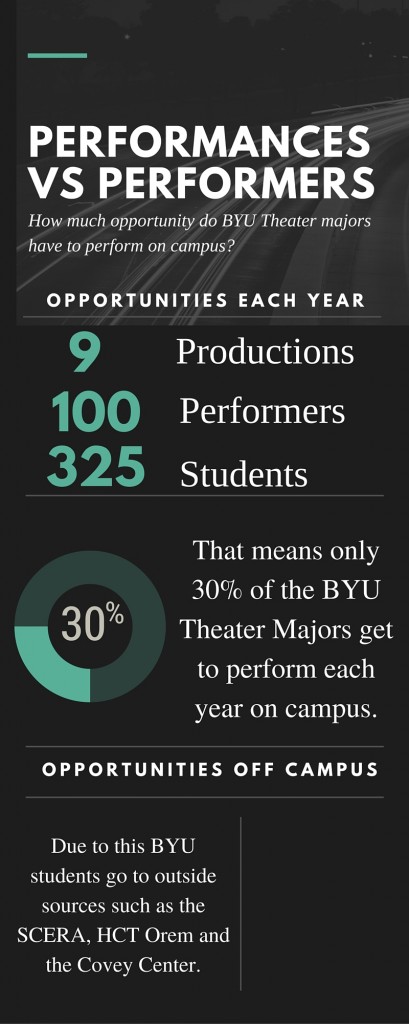BYU students participating in theater programs often go off-campus to find opportunities to perform in local community productions.
Hundreds of BYU students audition for the theater program every year. Only a select few make it into the programs. Theater majors are not secured a spot in on-campus performances even with a place in one of the programs.
Chair of the Theater and Media Arts department, Wade Hollingshaus said there is a variety of shows that students can perform.

“Students can perform in main stage productions, advanced directing students’ projects, intermediate students’ directing projects, BFA Acting conservatory projects, and BFA Acting mask productions,” Hollingshaus said.
The amount of performers needed is limited even with the many opportunities presented. There are only nine productions listed for the theater department throughout this school year. Limited cast sizes and the ability to audition from outside the major can cause a decrease in opportunities for performing on-campus.
There are approximately 100 roles to be cast for the nine productions that will be held this year. With around 325 students in the theater major, that only allows 30 percent of students in the program to perform on campus every year.
Whitney Hatch, a MDT major, said she wishes there were more musicals done on campus every year.
“I think there is an imbalance between the amount of straight plays BYU does and musicals. There are a lot of plays but only one musical a year which makes it hard for MDT students to really expand their resume here,” Hatch said. “I personally wish they did more musicals so more people could have a chance to be in them and be leads in them.”
Students have adapted by finding outside sources for their performance experiences. Several local community and semi-professional theaters find BYU students a welcome addition to their casts.
April Berlin, a manager for the SCERA Theater, said the theater estimated about 20 percent of their casts are current BYU students. They also have a lot of BYU alumni participate in their shows. Berlin said students come to the show for the opportunity to perform and the environment.
“Utah offers a lot of opportunities to perform, and I think actors and singers enjoy any opportunity to share their talent. Community theater like the SCERA is a great place to start and to hone performing skills, make new friends and perform in front of new audiences,” Berlin said.
Meagan Downey from Hale Center Theater Orem said about five to 10 percent of their performers are current BYU students. She said while some come for the paid stipend associated with Hale Center Theater, there is also the benefit of gaining experience.
“Performing locally is a great opportunity to test the skills that they learn in school. Often, the process in educational theater is very long and unlike anything you would experience in the outside performing world. Professional and community shows run on a much more abbreviated schedule,” Downey said. “In educational theater, students are sometimes cast “against type” to use as a learning experience. Performing outside of school gives them experiences learning and performing within their cast ability.”
Some community theaters wish for more BYU students to come to their theater. Laura Snyder from the Alpine Community Theater said they wish they had more students come and participate. Snyder said the community theater is often used as either a learning experience or a chance to have fun for the summer.
Hatch said as a student it can be sometimes tricky to be involved in community theater because of the lack of commitment from some performers, but it can also turn out to be a great.
“When you’re working with committed people, community theaters can be a blast and you can put on a great show,” Hatch said.
For tips on preparing for an audition, see 7 Ways to Prepare for an Audition.
To find out the benefits of community theater, see the Community Theater and Its Perks blog.




